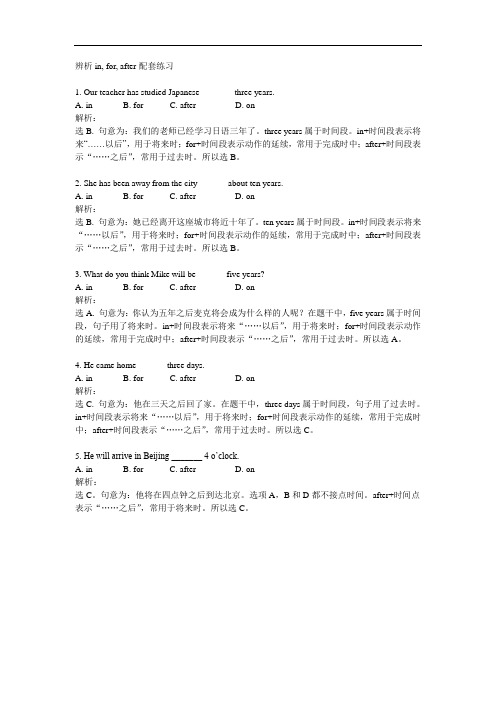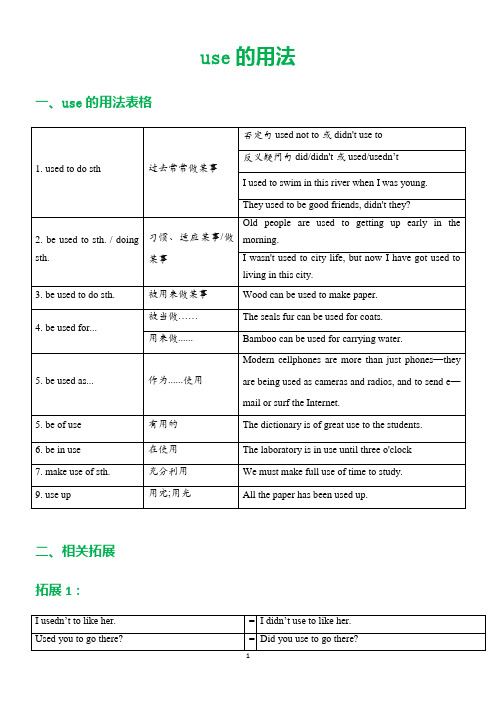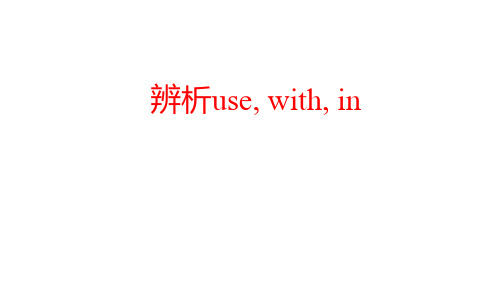辨析use,with,in-配套练习
- 格式:doc
- 大小:30.00 KB
- 文档页数:1

辨析in, for, after-配套练习1. Our teacher has studied Japanese _______ three years.A. inB. forC. afterD. on解析:选B. 句意为:我们的老师已经学习日语三年了。
three years属于时间段。
in+时间段表示将来“……以后”,用于将来时;for+时间段表示动作的延续,常用于完成时中;after+时间段表示“……之后”,常用于过去时。
所以选B。
2. She has been away from the city ______ about ten years.A. inB. forC. afterD. on解析:选B. 句意为:她已经离开这座城市将近十年了。
ten years属于时间段。
in+时间段表示将来“……以后”,用于将来时;for+时间段表示动作的延续,常用于完成时中;after+时间段表示“……之后”,常用于过去时。
所以选B。
3. What do you think Mike will be ______ five years?A. inB. forC. afterD. on解析:选A. 句意为:你认为五年之后麦克将会成为什么样的人呢?在题干中,five years属于时间段,句子用了将来时。
in+时间段表示将来“……以后”,用于将来时;for+时间段表示动作的延续,常用于完成时中;after+时间段表示“……之后”,常用于过去时。
所以选A。
4. He came home ______ three days.A. inB. forC. afterD. on解析:选C. 句意为:他在三天之后回了家。
在题干中,three days属于时间段,句子用了过去时。
in+时间段表示将来“……以后”,用于将来时;for+时间段表示动作的延续,常用于完成时中;after+时间段表示“……之后”,常用于过去时。
所以选C。

关于use的用法及解释一、 use作名词 1. 作用途解是可数名词。
Can you find a use for these empty boxes? 你能给这些空盒子派上用场吗? I need a tool with many uses. 我需要一件有多种用途的工具。
2. 作使用; 效用; 使用权解是不可数名词。
多用于以下的固定短语中。
1) (be) in use 正在使用。
The dictionary is in use. 词典正被使用。
2) (be) of use= useful有用处; 起作用。
of no use无用;无益E.g: The cellphone is of great use. 手机很有用。
E.g: Is it of any use to you?3) make (good / full ) use of (好好 / 充分)利用 E.g: We should make full use of every minute in order to learn English well.为了学好英语,我们应该充分利用每一分钟。
此外,还有come into use(开始使用),be out of use 不再使用,没人使用; have the use of(有权使用),There is no use doing sth. / It's no use doing sth. (做某事没有用)等搭配。
E.g: Use makes perfect. 熟能生巧二、 use作动词 1. 使用;运用;利用。
use sth. to do sth.As a student, you should learn how to use a dictionary. 作为学生,你应该学会如何使用词典。
We use a knife to cut cakes.May I use your telephone?e up用完;用光。

use的用法一、use的用法表格二、相关拓展拓展1:拓展二:常见的to是介词的短语。
be accustomed to doingdevote oneself to doinglook forward to doingpay attention to doingprefer doing to doing二、根据 use 的用法,试做下列练习I.用use, used to, be/get/become used to, be used as/for的适当形式填空。
1. As you know, cotton ________ make quilts.2. He came from the north, so he ________ such hot weather.3. Who knows the name of the tool that ________ lifting cars?4. English ________ a foreign language.5. The farmers in China ________ live a poor life, but now most of them live a happy life.6. Please give me a knife ________ .7. You will ________ living in the country.8. We ________ go there every year when I was young.9. People ________ coal to cook and heat.10. There ________ be a free market in this village.11. Once you ________ smoking, you can hardly stop it.12. He ________ Chinese tea five years ago when he was in China.13. A tape—recorder can ________ record your voice.14. We ________ live in the city, but now we live in the countryside.15. This machine ________ make farm tools.16. I prefer not to go there by plane. I ________ (not) flying.17. It was a bit of shock: I ________ (not) paying so much for a Beijing roast.18. The medicine ________ externally only.19. A new production line has been put ________ in this factory since last month.20. I ________ (not) learning in a noisy situation.21. Life here is much easier than it ____________ be.22. He ______________ hard work.23. I’ve lived in Paris for six years now, so I’m quite _________ the traffic.24. It’s difficult to understand Scottish people if you______________ their accent.25. It was a bit of a shock: I___________________ paying so much for a sandwich and a glass of beer.26. I don’t play tennis much these days, but I ____________.27. The wood ______________ make desks and chairs.Ⅱ.用括号中动词的适当形式填空1. You’ll soon get used to ___________(live) in the country.2. I never used to ___________(eat) cakes, but I eat a lot now.3. I’m not used to _____________(treat) like this.4. When I was younger I was used to ____________(walk) long distances.5. I used to ___________(go) swimming on Saturdays.6. Didn’t she use to ____________(live) in Germany?7. My cousin is used to ________(study) with his new friends in Australia. (南京)8. My mother is used to ________(get) up early to cook breakfast for us. (一模)9. Mr Bush is used to __________(get) up early in the morning. (一模)10. Jim has lived in Australia for two years. He is used to _________(驾驶) on the left.III.单项选择1. —Is Paul playing soccer and tennis for the school?—He ________ . But now he has given them up.A. isB. hasC. used toD. had2. Bamboo can ________ water, cant it?A. get used to carryingB. be used to carryingC. have used to carryD. be used to carry3. I'm not used to ________ like that.A. being spoken toB. be spoken toC. spoken toD. speaking to4. —Have you got used to ________ on this kind of computer?—Not yet, because I used to ________ the abacus before.A. work; useB. working; useC. work; usingD. working; using5. He used ________ on the right in China, but he soon got used ________ on the left in England.A. to drive; to driveB. to drive; drivingC. to driving; to driveD. to drive; to driving6. Has the boy who was made use of ________ realized his mistake?A. stealingB. stolenC. to stealD. for stealing7. The old professor said to us every part of the material should be made use of ________ the power station.A. to buildB. buildingC. buildD. built8. Every possible means ________ to prevent the air pollution, but the sky is still not clear.A. has to useB. are usedC. has been usedD. have used9. There ________ a lot of red—crowned cranes in this area.A. was used toB. was used to beC. used toD. used to be10. She used to ______ with her parents, but now she is used to ______ with her classmates at school. (泰州)A. live; livingB. live; liveC. living; livingD. living; live11. He used to ____ in a small village, but now he has been used to ___ in the big city. (镇江)A. live; livingB. live; liveC. living;livingD. living; live12. Mrs Green _______ go to hospital, but now she is in good health.A. has toB. need toC. used toD. ought to13. My grandpa ________a worker, but now he has retired.A. used to beB. use to beC. isD. used to have14. We _________in this pool when we were young, but now it _____fish.A. are used to swim, used toB. are used to swimming, is used to keep.C. used to swim, used to keepD. used to swim, is used for keeping15. My sister ________ a car to go to work, but now he walks to work.A. used to driveB. use to driveC. drivesD. used to driving16. Mr. Brown _______go to bed late, but now he ______going to bed early.A. used to, used toB. used to, is used toC. is used to, used toD. is used to, is used to17. The knife is _______bread.A. used to cutB. used to cuttingC. use to cutD. used for cut18. He used to ________in the sun, but now he is sued to __________at night.A. read, readB. reading, readC. read, readingD. reading, reading19. This kind of cloth is used ______dress.A. to makingB. to makeC. to be madeD. making20. How does Jack usually go to school? —He ___ride a bike, but now he ___there to lose weight.A. used to, is used to walkB. was used to, is used to walkingC. was used to, is used to walk C. used to, is used to walking21. There ________ a lot of red—crowned cranes in this area.A. was used toB. was used to beC. used toD. used to be22. She used to ______ with her parents, but now she is used to ______ with her classmates at school. (泰州)A. live; livingB. live; liveC. living; livingD. living; live23. He used to ____ in a small village, but now he has been used to ___ in the big city. (镇江)A. live; livingB. live; liveC. living;livingD. living; live24. Mrs Green _______ go to hospital, but now she is in good health.A. has toB. need toC. used toD. ought to25. My grandfather _______a policeman when he was young.A. use to beB. used to isC. used to areD. used to beⅣ. 翻译句子1.几个月后他就习惯了一个人生活了。

by,with,in,through,use辨析!by,with,in,through,use辨析:by通过……方法、手段,1.如交通工具等。
by+动词的-ing形式表示用“用……手段或方式”,其后也可接名词,表示“借助……手段”。
by+交通工具类名词,在表示交通工具的bus,train,plane,taxi,ship前不必加任何冠词。
He went there by plane.他坐飞机去的那里。
The poor blind learned to play the piano by listening.这个可怜的盲女通过听来学弹钢琴。
2. with指的是使用工具、方法等。
She drew the picture with a short pencil.她用一支铅笔画了这幅画。
3 . in用某种材料或某种语言,或者表示衣着、声调、特点等。
He read the text in a low voice.他低声地读课文。
The girl in red is my sister.穿红衣服的女孩是我的妹妹。
4. through+名词,指方法和手段时,意为“经由,通过,以”,强调原因、理由和作用,作“由于”解。
through还可表示从某个空间穿过。
He made many mistakes in the exam through hiscarelessness.由于粗心大意,他在考试中犯了许多错误。
5. use当动词讲时,虽然也表示“使用”,但它在句子中的功能不同,常用作谓语。
May I use your English dictionary?我可以用一下你的英语字典吗?【典例分析】1. He dug a hole in the ground _ his hands.A.byB.withC.inD.through【答案】B考点:考查近义词辨析。

中考英语介词辨析练习题30题1.He was born in 1998.inonat答案:in。
in 用于年份、月份、季节等较长的时间范围。
1998 是年份,所以用in。
on 用于具体的某一天,at 用于具体的时刻。
2.She usually gets up at six o'clock.inonat答案:at。
at 用于具体的时刻。
six o'clock 是具体的时刻,所以用at。
in 用于年份、月份、季节等较长的时间范围,on 用于具体的某一天。
3.We have a party on New Year's Day.inonat答案:on。
on 用于具体的某一天。
New Year's Day 是具体的某一天,所以用on。
in 用于年份、月份、季节等较长的时间范围,at 用于具体的时刻。
4.My birthday is in May.inonat答案:in。
in 用于年份、月份、季节等较长的时间范围。
May 是月份,所以用in。
on 用于具体的某一天,at 用于具体的时刻。
5.They will go on a trip in summer.inonat答案:in。
in 用于年份、月份、季节等较长的时间范围。
summer 是季节,所以用in。
on 用于具体的某一天,at 用于具体的时刻。
6.The meeting will start at 3 pm on Monday.inonat答案:at on。
at 用于具体的时刻,3 pm 是具体的时刻,所以用at;on 用于具体的某一天,Monday 是具体的某一天,所以用on。
in 用于年份、月份、季节等较长的时间范围。
7.She arrived in Beijing in 2022.inonat答案:in。
in 用于年份、月份、季节等较长的时间范围。
2022 是年份,所以用in。
on 用于具体的某一天,at 用于具体的时刻。

辨析inside,in,into-配套练习1. Please fold this piece of paper ______ a boat.A. intoB. insideC. inD. on解析:选A. 句意为:请把这张纸折成一只小船。
inside是介词,语气较强,常用来强调某人或某事所在地含有某种特殊情况,对应词是outside。
in是介词,意为“在……里面”,强调静态,用于建筑物或建筑物内的房间,有围栏或围墙的地方等。
而into则强调动态,指的是由外而内的动作过程。
对应词是out of。
fold into意为“把……折成”,故选A。
2. Children are playing games _________.A. intoB. insideC. inD. on解析:选B. 句意为:孩子们正在里面玩游戏。
选项A,C和D常用于介词,而选项B表示“在里面”,可作副词。
所以选B。
3. Jenny has to go ______ to put her coat.A. intoB. insideC. inD. on解析:选B. 句意为:詹妮不得不走进去放她的外罩。
选项A,C和D常用于介词,而选项B表示“在里面”,可作副词。
本题放在动词go后面,应该用副词inside。
所以选B。
4. Can I have a cake with eggs _______ ?A. intoB. insideC. inD. on解析:选B. 句意为:我可以吃一个带鸡蛋的蛋糕吗?选项A,C和D常用于介词,而选项B表示“在里面”,可作副词。
本题放在eggs后面作宾语补足语,应该用副词inside。
所以选B。
5. Put the science books _______ the box and take them _______ the classroom.A. into; withB. in; intoC. into; toD. inside; in解析:选C。
初一英语语义辨析深化练习题40题含答案解析1.There are many books on the _____.A.deskB.chairC.floorD.wall答案解析:A。
desk 是书桌,通常会放书;chair 是椅子,一般不会放很多书;floor 是地面,不太可能专门放书;wall 是墙,不是放书的地方。
2.She always writes with a _____.A.penB.pencilC.rulerD.eraser答案解析:A。
pen 是钢笔,用来写字;pencil 是铅笔,通常用于绘画或书写不太正式的内容;ruler 是尺子,用来测量;eraser 是橡皮,用于擦除。
3.The teacher is standing in front of the _____.A.blackboardB.doorC.windowD.bookcase答案解析:A。
blackboard 是黑板,老师经常站在黑板前讲课;door 是门;window 是窗户;bookcase 是书柜。
4.We have classes in the _____.A.playgroundB.libraryC.classroomD.canteen答案解析:C。
classroom 是教室,上课的地方;playground 是操场,用于运动;library 是图书馆,用于看书借书;canteen 是食堂,用于吃饭。
5.He is reading a _____ in the library.A.newspaperB.magazineC.bookD.dictionary答案解析:C。
在图书馆通常读book;newspaper 是报纸,一般在报摊等地方看;magazine 是杂志;dictionary 是字典,用于查单词。
6.The students are doing their _____ in the classroom.A.homeworkB.houseworkC.workD.job答案解析:A。
初一英语语义辨析深化实战练习题30题含答案解析1.I have a lot of _____.A.booksB.pencilsC.rulersD.erasers答案解析:A。
books 是书,pencils 是铅笔,rulers 是尺子,erasers 是橡皮。
这里a lot of 后面可以跟可数名词复数,四个选项都是可数名词复数。
但是结合校园生活场景,书是比较常见且能涵盖很多学习方面的物品,所以选择books。
2.My mother is very _____.A.kindB.beautifulC.tallD.thin答案解析:A。
kind 是善良的,beautiful 是美丽的,tall 是高的,thin 是瘦的。
在家庭生活场景中,通常会用kind 来形容母亲的性格温和善良,其他三个选项更多是形容外貌和身材,不太符合通常对母亲性格的描述。
3.There are many _____ in our school.A.teachersB.studentsC.classroomsD.books答案解析:C。
teachers 是老师,students 是学生,classrooms 是教室,books 是书。
在校园场景中,学校里有很多教室是比较符合实际的,老师和学生虽然也很多,但通常不会直接用many 来修饰,书一般放在教室或者图书馆等地方,不是学校里直接有很多书。
4.I like my _____ teacher very much.A.ChineseB.mathC.EnglishD.history答案解析:C。
Chinese 是语文,math 是数学,English 是英语,history 是历史。
在初一的学习中,英语通常比较受学生关注,而且在四个选项中比较具有代表性,所以选择English。
5.My father is a _____.A.doctorB.teacherC.workerD.driver答案解析:A。
七年级英语词汇辨析单选题30题1.There are many books on the desk. Which one is your_____?A.notebookB.pencilC.textbookD.eraser答案:C。
本题主要考查名词辨析。
notebook 是笔记本;pencil 是铅笔;textbook 是课本;eraser 是橡皮。
题干中说桌子上有很多书,问哪个是你的某物,结合校园生活场景,书桌上最可能出现的是课本。
2.In the classroom, you can see students using different_____.A.pensB.rulersC.schoolbagsD.desks答案:A。
pens 是钢笔;rulers 是尺子;schoolbags 是书包;desks 是书桌。
在教室里,学生们使用不同的文具,钢笔是常用文具,比较符合语境。
3.Our teacher writes on the_____with chalk.A.blackboardB.doorC.windowD.floor答案:A。
blackboard 是黑板;door 是门;window 是窗户;floor 是地板。
老师用粉笔在黑板上写字是校园生活常见场景。
4.After class, students put their_____away.A.clothesB.booksC.toysD.fruits答案:B。
clothes 是衣服;books 是书;toys 是玩具;fruits 是水果。
下课后,学生们把书收起来符合校园生活习惯。
5.During the exam, students need a_____to write.A.penputerC.phoneD.magazine答案:A。
pen 是钢笔;computer 是电脑;phone 是手机;magazine 是杂志。
考试时学生需要用钢笔写字。
辨析use,with,in-配套练习
1. What’s this ______ English?
A. use
B. in
C. with
D. by
解析:
选B。
句意为:这个用英语怎么说?in表示“用某种语言”。
所以选B。
2. She wrote the letter ______ a new pen.
A. use
B. in
C. with
D. by
解析:
选C。
句意为:他用一只新钢笔写了这封信。
表示“用某种工具”,并且前面有冠词时,通常用介词with。
所以选C。
3. Don’t write it _____ pencil but _____ ink.
A. in; with
B. with; in
C. with; with
D. in; in
解析:
选D。
句意为:不要用铅笔写,要用钢笔写。
表示“用某种工具”,并且前面没有冠词时,要用介词in;用某种材料时,也要用in。
所以选D。
4. Lily cut her hand_____ a knife.
A. use
B. in
C. with
D. by
解析:
选C。
句意为:李莉用一把小刀把他的手弄破了。
表示“用某种工具”,并且前面有冠词时,通常用介词with。
所以选C。
5. Chinese often ______ chopsticks to have meals.
A. use
B. in
C. with
D. by
解析:
选A. 句意为:中国人经常用筷子来吃饭。
use是动词表示使用,本题缺少动词。
所以答案是A。